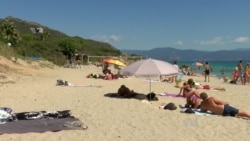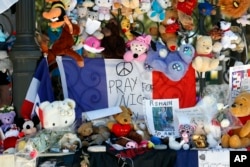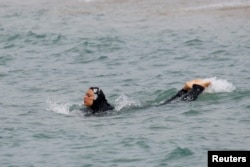In France, some referred to it as the summer of terror. Now, communities across the country are working to heal the wounds and avert what many French Muslims fear could be a backlash against them by politicians and citizens angry over extremists' attacks.
Inter-communal tensions have boiled over on the French-ruled island of Corsica. Muslims and non-Muslims clashed on a beach in August, after reports that a tourist had taken a photo of a Muslim woman bathing on a beach in the town of Sisco touched off a riot.
Muslims and non-Muslims attacked each other with fists and weapons that reports said included machetes and a harpoon.
Fear has risen further after the island’s militant separatists, in defiance of the Paris government, said they are ready to take matters into their own hands if the Islamic State group carries out an attack on the island.
There have been no specific terrorism warnings on Corsica, but, as summer winds down, the island’s beaches became a focal point in France’s battle of cultures - marked by attacks on the French mainland, such as the truck attack in Nice that killed 86 people in July and the murder, also in July, of an elderly Catholic priest during Mass in Normandy. The Islamic State group claimed responsibility for both attacks.
Who defends Corsica?
Corsica’s isolation and its fierce separatist drive have many feeling like Paris is not doing enough to protect them. After the bloodshed in France, the Corsican National Liberation Front warned the Islamic State that any attack against the Corsican people would precipitate a “determined response,” without hesitation or guilt.
“Beyond that statement, I think Corsica’s entire population is asking, ‘who is going to defend us. Are we obliged to defend ourselves? And by what means?’” asked Francis Nadizi, regional secretary of the far-right National Front party headed by Marine Le Pen.
Corsica has one of France’s highest ratio of firearms per capita – one more reason why officials are taking the separatists’ statement seriously. They also are not ignoring the possibility of a terrorist attack on their soil.
“There is real concern because unfortunately the events of recent months have shown that no one is safe, and there are elements specific to Corsica that make us fear a rising risk,” said Gilles Simeoni, the island’s top elected official, told VOA.
In remarks published recently, Simeoni warned there has been a breakdown of the “integration machine” - a reference to questions about the local Muslim population’s willingness to integrate into Corsican society.
Mosques hit by arson
Even before this summer's beach riot, there have been confrontations. Attacks have included arson fires at Muslim places of prayer.
Signs of the tensions are less than subtle. In public restrooms and fences, graffiti demand: “Arabi Fora,” Corsican for “Arabs Out.”
In December, a mob smashed windows and ransacked a prayer hall in the island’s main city, Ajaccio. The incident happened after Muslim youths ambushed firefighters and police who were responding to reports of illegal bonfires.
The prayer hall’s director, Abdel-Mounim el Khalfioui, said the tensions - including those surrounding the controversy over burkinis - have intensified the conversation about what it means to be Muslim in Corsica.
“Integrating into a society does not mean rejecting one’s culture of origin in order to adopt another. That for me is not integration,” el Khalfioui said. “Integration is respecting the laws, respecting the land that welcomes you, respecting its traditions, respecting people, but at the same time holding on to your culture of origin.”
Islamic garments an issue
But some Corsicans disagree. Like many people on the French mainland, they say Islamic vestments drive a wedge between Muslims and the rest of the population.
“I think, quite sincerely, that it is a provocation," said the National Front's Nadizi. "They will begin by the visual aspect of their vestments, before staking their communitarian claims.”
“It could be that people will see it as a provocation, like if a man sees a naked woman walking on the street. She is going to tell him, ‘I am free,’ but he sees it as a provocation,” said Sabri Merdaci, a 24-year-old building maintenance worker born on Corsica to Algerian and Tunisian parents. Merdaci wears a beard and sometimes a galabiyya, or tunic. “We see it as a choice that one makes in regard to religion, to identity, as it relates to Islam,” he said.
Merdaci said he avoids beaches where French women often sunbathe topless.
Given the hostility already shown to their community, some of Corsica’s Muslims worry any retaliation against Islamic State could spill into retaliation against them.
In a meeting last week, a group gathered to vent their concerns about the Corsican separatists’ warning to the Islamic State. “We took this as a provocation for those who may want to carry out an attack in Corsica, and so it is us who would have to pay,” said Mohamed Jouablia, head of an association of Tunisian immigrants.
“It means someone does something wrong and the group reacts, goes after the other. It is collective punishment, and that is disgusting. It is unacceptable. It is that which worries us,” said another member, Zerdalia Dahoun, a native of Algeria. “The concept of justice is dangerous. Inciting people to do justice themselves has roused the extreme on both sides,” she said.







